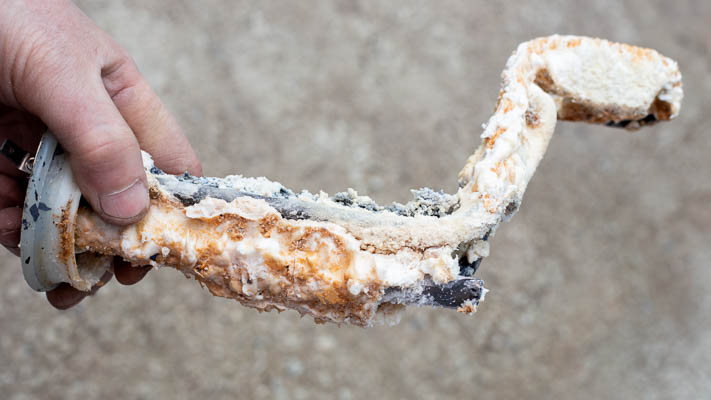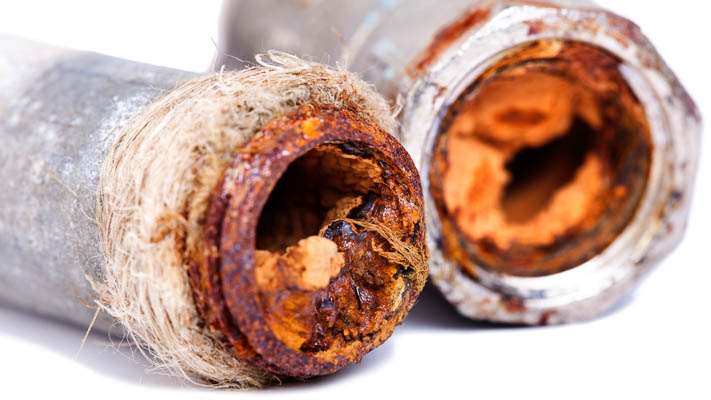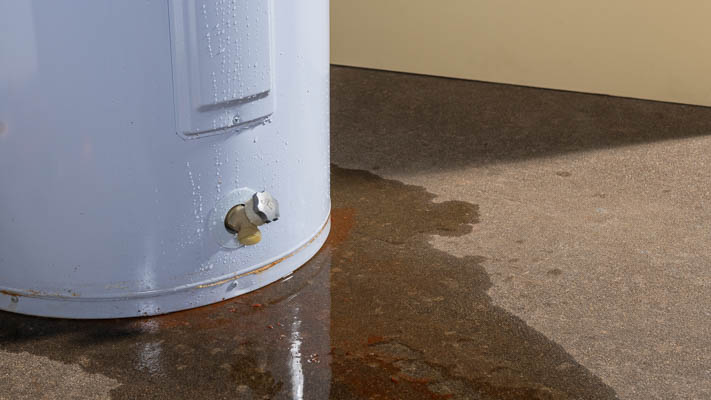Why Is My Water Heater Leaking?
Water heater leaks can happen for several reasons, ranging from minor component failures to complete tank breakdowns. Often, the first sign is water pooling around the base of the unit. However, by the time you see water on the floor, the problem may already be advanced.
One of the most common causes of water heater leaks is simple wear and tear. As water heaters age, internal components like valves, pipes, and even the tank itself begin to deteriorate. Corrosion from years of exposure to minerals and water pressure can cause cracks to form inside the tank, leading to slow but persistent leaks.
In other cases, a leaking water heater may be the result of a faulty drain valve, a broken temperature and pressure relief (T&P) valve, or loose inlet and outlet pipe connections. While some of these issues can be repaired individually, leaks from the tank itself usually indicate that the water heater has reached the end of its service life and needs to be replaced.
What Are the Common Causes of a Leaking Water Heater?
Several specific problems can cause a water heater to leak. Understanding these issues can help you catch them early and avoid major water damage:
- Corrosion and Rust: Over time, the inside of the tank can corrode due to constant exposure to water and minerals. Rust weakens the metal and eventually causes the tank to leak.
- Sediment Buildup: Hard water minerals can settle in the tank, creating a layer of sediment. This sediment traps heat, causing the tank to overheat and deteriorate faster.
- Faulty Pressure Relief Valve: The pressure relief valve prevents excessive pressure buildup inside the tank. If it fails or becomes clogged, pressure can rise to dangerous levels, causing leaks either from the valve itself or from weakened seams in the tank.
- Loose Connections: The cold water inlet and hot water outlet pipes can loosen over time due to constant temperature changes and pressure fluctuations. A simple tightening may fix minor leaks at these points.
- Broken Drain Valve: The drain valve at the bottom of the tank can fail over time, leading to small leaks that eventually worsen.

Each of these issues highlights the importance of regular water heater inspections and maintenance. A professional plumber can help identify and address these problems early—before they lead to a larger failure.
Can a Leaking Water Heater Cause Low Water Pressure?
A leaking water heater can easily cause low water pressure, and it's a warning sign you should not ignore. A leaking water heater affects your home's overall plumbing system in several ways, often leading to a noticeable drop in water pressure.
First, leaks reduce the volume of hot water available for use. When the tank is partially empty due to a leak, your fixtures may experience lower flow rates, especially when using hot water.
Second, sediment buildup—often associated with aging or leaking water heaters—can clog internal tank components and connected piping. This restricts water flow and can cause both hot and cold water pressure issues throughout your home.
Other contributing factors include:
- Clogged Pipes: If your water heater releases rust particles or debris into your water lines, these materials can accumulate, narrowing pipe diameter and slowing water flow. Rust particles in your drinking water can also be a tell-tale signs of the presence of outdated galvanized pipes, which all require replacing.
- Faulty Pressure Regulators: Some water heaters have built-in pressure regulators. If these pressure regulators fail, they can cause consistently low water pressure throughout the household.

In short, if you're noticing both leaks and poor water pressure, it's important to have your water heater (and possibly your broader plumbing system) inspected as soon as possible.
How Can I Prevent My Water Heater from Causing Low Water Pressure?
Preventing low water pressure caused by a faulty water heater starts with proactive maintenance and regular inspections. Here's how you can help keep your system in top shape:
- Flush the Tank Regularly: Flushing your water heater at least once a year removes sediment buildup, improves efficiency, and prevents internal blockages that can reduce water flow.
- Inspect and Replace Faulty Valves: Check the temperature and pressure relief valve and the drain valve periodically. If either shows signs of leaking or malfunctioning, have them replaced promptly.
- Monitor for Signs of Corrosion: Look for rust-colored water, odd noises from the tank, or pooling water around the base—all indicators that corrosion may be occurring inside your tank.
- Check Your Pipes: Sometimes low pressure is not just about the water heater. Corroded or partially blocked pipes can restrict flow across the entire system. If you notice widespread water pressure issues, your pipes could be the problem.
Signs of Systemic Plumbing Problems
It's important to be aware of systemic signs of low water pressure that go beyond just one fixture or appliance. These include poor water flow throughout the home (not just at hot taps), noticeable pressure drops during simultaneous water usage (e.g., running the dishwasher and shower), and long delays for hot water to reach fixtures. Discolored water, particularly brown or rust-tinged, can also be a red flag that your pipes are deteriorating internally.
In many cases (particularly in older homes with original plumbing), these symptoms point to deeper issues. These include aging pipes that are corroded, mineral-encrusted, or leaking behind walls. When low water pressure becomes a house-wide problem and routine water heater maintenance doesn't resolve it, it's often a sign that your plumbing system is failing.
In these instances, a full home repipe is the most reliable and permanent solution. It not only restores strong, consistent water pressure but also ensures that your plumbing is clean, efficient, and built to last.
A full home repipe is far quicker and easier than you might think. Contact us to schedule a free consult with one of our expert repipe consultants. They'll be more than happy to talk you through your home's repipe options.
Get your free estimate today
With over 75,000 repipes completed, we've perfected our One-Stop Repipe™ for your home.
Get a Quote to Repipe Your Home's Water Lines
Here at Repipe Specialists, we've fully replaced plumbing in thousands of homes across the USA with modern Uponor PEX-A tubing or copper pipe. We consistently receive positive feedback from customers about how pleased they are with their fast-flowing, high-pressure water after a repipe. We often exceed their expectations on:
- Speed: Our repipe crews typically complete a repipe in a day, returning on another day for wall patching.
- Convenience: Through our One-Stop Repipe™ process, we handle everything from permits, to wall patching, to inspections.
- Cleanliness: Our crews are trained to protect your home while working (we cover all surfaces with protective sheeting), and to clean up fully at the end of each day.
- Peace of Mind: Repipe Specialists is a fully licensed plumber in every state we operate in, and we back all of our repipes with a lifetime warranty.
- Financing programs: To help take the sting out of unplanned repipe expenses, we offer several financing programs.
- Price: As a specialist that performs hundreds of repipes a week, we can deliver high-quality repipes at a lower cost vs generalist plumbers. We have another article that covers whole house repipe cost factors in detail. Our quotes typically range from $4,500 to $15,000 depending on the size and complexity of your project.
Schedule a free in-home consult, and a local repipe consultant will explain all your repiping options and provide you with a written, fixed price quote.

